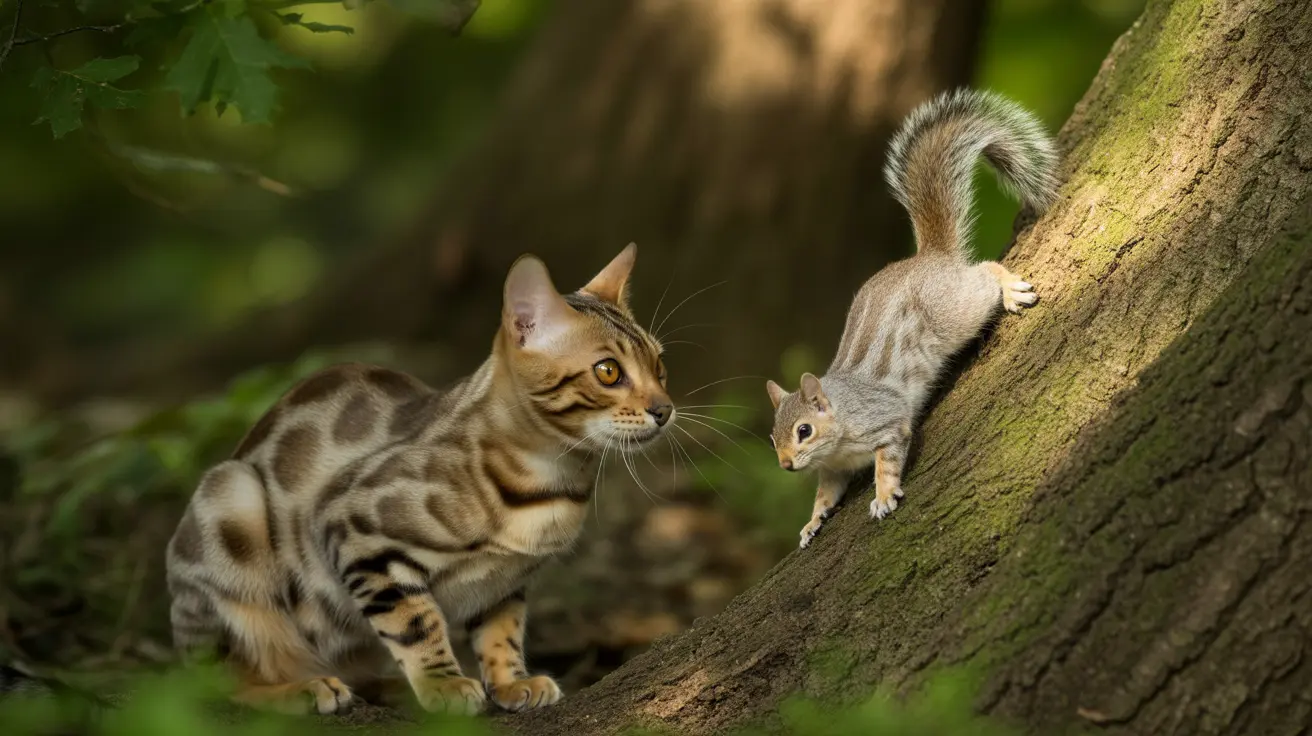Cats are natural-born hunters with an instinctive drive to chase and capture prey. While mice and birds are more common targets, many cat owners wonder about their pets' interactions with squirrels. This comprehensive guide explores whether cats eat squirrels, the associated risks, and what this behavior means for both domestic and feral cats.
Natural Hunting Instincts of Cats
All cats, whether domestic or wild, possess strong predatory instincts as obligate carnivores. These instincts drive them to stalk, chase, and potentially catch various prey animals, including squirrels. While house cats may be well-fed with commercial cat food, their hunting behaviors remain deeply ingrained.
The predatory sequence typically involves stalking, chasing, capturing, and potentially consuming the prey. However, when it comes to squirrels, the size and agility of these rodents often make them more challenging targets compared to smaller prey.
Hunting vs. Eating: What Actually Happens
While cats certainly hunt squirrels when given the opportunity, actual consumption is less common, particularly among domestic cats. Well-fed house cats often engage in hunting purely for sport, following their natural instincts rather than hunting for sustenance.
Feral cats, on the other hand, may be more likely to eat squirrels out of necessity. These cats rely on hunting for survival and will consume various prey animals, including squirrels, to meet their nutritional needs.
Health Risks and Concerns
When cats do eat squirrels, they face several potential health risks:
- Parasitic infections from consuming raw meat
- Exposure to diseases that squirrels may carry
- Physical injuries from the squirrel fighting back
- Choking hazards from bones
- Internal injuries from sharp bone fragments
These risks are particularly concerning for domestic cats who have access to safe, balanced commercial diets.
Prevention and Safety Measures
To protect your cat from the risks associated with hunting and eating squirrels:
- Keep cats indoors or supervise outdoor time
- Provide adequate nutrition through proper cat food
- Ensure regular veterinary check-ups
- Consider using cat bells to warn potential prey
- Create engaging indoor environments to satisfy hunting instincts
Frequently Asked Questions
Can domestic cats actually hunt and eat squirrels, and how common is this behavior?
Yes, domestic cats can hunt squirrels, though successful catches are relatively rare due to squirrels' agility and size. While hunting behavior is common, actual consumption of squirrels is more frequently observed in feral cats than well-fed domestic cats.
What health risks should I be aware of if my cat eats a squirrel?
The main health risks include parasitic infections, exposure to diseases, potential injuries from bones, and complications from fighting with the squirrel. If your cat has eaten a squirrel, monitor them closely and consult a veterinarian if you notice any concerning symptoms.
Why do some cats bring dead squirrels to their owners instead of eating them?
This gift-giving behavior is a natural instinct where cats, especially well-fed ones, bring prey to their "family" as a way of sharing resources and teaching hunting skills. It's more common for domestic cats to present their catches rather than eat them.
How can I prevent my pet cat from hunting or eating squirrels outdoors?
The most effective prevention methods include keeping cats indoors, supervising outdoor time, ensuring they're well-fed, and providing alternative forms of enrichment and exercise to satisfy their hunting instincts.
Are squirrels a safe or nutritious food source for feral versus domestic cats?
While squirrels can provide nutrition for feral cats who rely on hunting for survival, they're not a safe food source for domestic cats. The risks of disease, parasites, and injury outweigh any potential nutritional benefits for cats who have access to commercial cat food.
Conclusion
While cats can and sometimes do eat squirrels, this behavior carries significant risks, particularly for domestic pets. Understanding your cat's natural hunting instincts while taking steps to protect them from the dangers of consuming wild prey is essential for responsible pet ownership. For most house cats, a high-quality commercial diet remains the safest and most nutritious feeding option.






